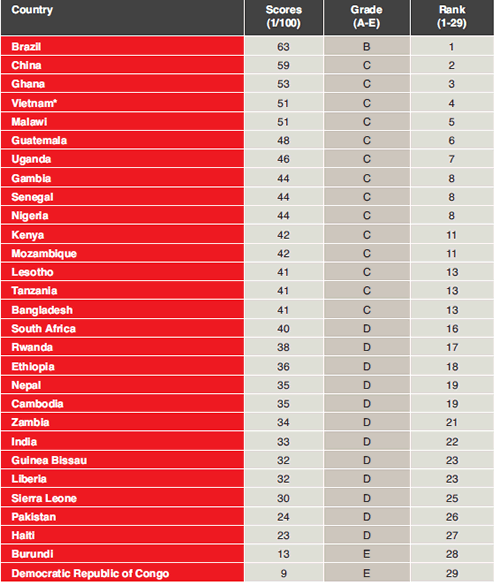Who are Best/Worst in Fight against Poverty ?
 |
| The Ranking by ActionAid of Developing Countries based on their committment to fight against poverty/ |
Over one billion people – a sixth of humanity - don’t have enough to eat. Almost a third of the world’s children are growing up malnourished. This is perhaps one of the most shameful achievements of recent history, since there is no good reason for anyone to go hungry in today’s world.
In this scenario, it is required to assess how governments are performing in their fight against poverty. This "Heros" and "Zeros" list will create the required push and pull in taking action by the governements. Keeping in tune with this, ActionAid has published a ‘HungerFREE Scorecard’ in the run up to next week’s World Summit on Food Security.
Developing countries have been graded on four indicators: their legal commitment to the right to food, their investment in agriculture and social protection, and their performance on hunger and child nutrition.
Ability and commitment to fight hunger does not depend on wealth. Some relatively poor countries have made striking progress. On the other hand, some middle income countries have allowed rural misery to deepen in the midst of growing wealth. Pakistan, for instance, is performing no better than desperately poor and conflict-torn countries such as Sierra Leone, despite having a per capita income over two and half times higher. India ranks below Ethiopia and Cambodia.
- Brazil tops our league table, showing what can be achieved when the state has both resources and political will to tackle hunger. President Lula da Silva has made it his objective to eradicate hunger. Within six years, the program Fome Zero (ZeroHunger) has introduced food banks, community kitchens and locally procured school meals along with simultaneous support for smallholder family farmers and land reform settlers. The result: child malnutrition has fallen by 73 percent and child deaths by 45 percent.
- China (2nd place), through heavy investment in supporting its poor farmers and a relatively equitable distribution of land, has reduced the number of undernourished people by 58 million between 1990 and 2001. Now less than 9 percent of the population goes hungry.
- Ghana (3rd place) has made food security a national priority and backed this with consistent support to smallholder farmers and democratic, stable governance. Ghana has made remarkable strides in reducing hunger – especially for a low income country.
- Vietnam (4th place) pursued equitable land reform and investment in smallholders, and with relatively strong social policies has made unprecedented progress, reducing poverty by half in the decade of the nineties, with comparatively low levels of inequality.
- Even Malawi (5th place), one of the poorest countries in the world, and burdened with a devastating HIV epidemic to boot – has reaped rich results within three short years. Through a massive boost of investment to small scale farmers, it has trebled production to halt a famine that threatened to leave nearly a third of its population hungry.
In line with their different circumstances, the top five countries have followed different paths. However, they have some interesting things in common.
- Rejecting the conventional wisdom of the free-market era, all retained – or reclaimed – a central role for the state in agriculture, and especially in developing and supporting poor farmers (whether through credit, research and extension, technology, income or price supports, input subsidies or a combination of these, targeted on smallholders).
- While these countries have also invested in commercial agriculture for export, they have maintained or introduced specific policies to ensure that production of staple foods for domestic markets continues to thrive.
- They either already had a relatively equitable distribution of land or introduced land reforms (although land reform in Brazil needs to go much further).
- Finally, all have introduced basic social protection measures (although in Malawi and Ghana, which endured donor-imposed cuts in social spending in the 1990s, these are still at an early stage).
 If you agree that this situation of poverty is
unacceptable, make your voice heard by clicking on the "End Hunger" button on the left and sign on to the 'I AGREE' petition on the
page.
If you agree that this situation of poverty is
unacceptable, make your voice heard by clicking on the "End Hunger" button on the left and sign on to the 'I AGREE' petition on the
page.
